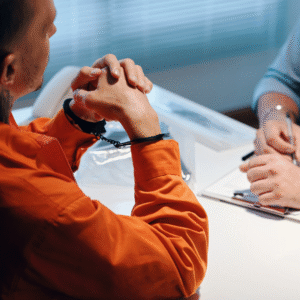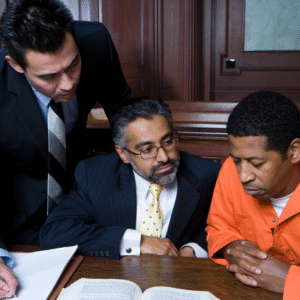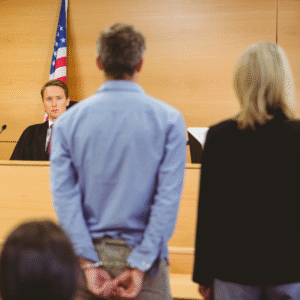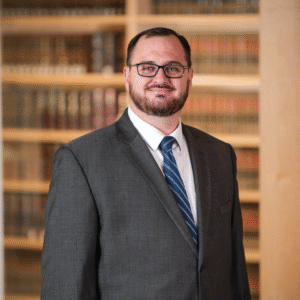A Day in the Life of a Utah Criminal Defense Attorney

When you picture an attorney, what comes to mind?
If you grew up watching popular movies, you’ll most likely think of a criminal defense attorney who advocates for their clients in the courtroom and gets confessions out of witnesses.
While there is some truth to this, being a successful Utah defense attorney involves much more. Behind every strong courtroom performance are hours of case preparation and a strong team consisting of paralegals, legal assistants, and private investigators.
To shed light on what the job is really like, I interviewed seasoned criminal defense attorney (and professional Star Wars collector) Jonathan T. Nish. Mr. Nish represents clients who face charges ranging from misdemeanors to capital crimes. He provided insights into the work, the people, and the environment required to thrive in this demanding but rewarding profession.
Morning of a Utah Criminal Defense Attorney: How the Day Starts
Jonathan Nish’s day often begins before sunrise. Court hearings, client meetings, and last-minute motions mean mornings can be a whirlwind of reviewing evidence, meeting with clients, and strategizing with colleagues.
“If I have court in the morning, I’m usually reviewing my notes as I get ready,” Nish explained. “I’ll double-check exhibits, make sure witnesses are confirmed, and mentally walk through my argument so I’m ready to respond to whatever happens.”
He emphasized that the real heavy lifting is done before the hearing. Case preparation requires digging through police reports, cross-referencing witness statements, and staying up to date with evolving case law.
Supporting Clients Beyond the Courtroom
 A Utah criminal defense attorney’s role is to advocate for people going through the hardest moments of their lives, that means navigating not just the legal system, but the human emotions associated with their case.
A Utah criminal defense attorney’s role is to advocate for people going through the hardest moments of their lives, that means navigating not just the legal system, but the human emotions associated with their case.
“Sometimes I’m the first person in a long time who has really listened to a client,” Nish said. “They might be scared, confused, or just overwhelmed by the process. My job isn’t only to defend them legally, it’s to help them feel like someone is in their corner.”
Most criminal cases don’t end in trial. In fact, many involve quiet negotiations, strategic plea deals, and advocating for fair outcomes in situations where the law can feel unforgiving.
What Makes a Good Criminal Defense Lawyer in Utah?
When asked what qualities clients should look for in an attorney, Mr. Nish was quick to dispel one popular misconception: that the best defense lawyers are always the most aggressive.
“Being a bulldog isn’t enough,” he said. “What you really want is someone who knows how to build relationships: with judges, with prosecutors, with court staff. That respect and trust can make a huge difference in negotiations and in how your case moves through the system.”
In other words, skillful defense work is equal parts strategy, communication, and credibility.
Trial Preparation for Utah Defense Attorneys
While not every case goes to trial, those that do require intense preparation.
“If it’s a one-day trial, I might spend a week getting ready. If it’s a three-day trial, I’ll block off three or four weeks,” Nish explained. “That includes meeting with witnesses, creating outlines for direct and cross-examinations, and anticipating the prosecution’s arguments.”
In Utah, where court dockets can be crowded, staying organized is crucial. Mr. Nish relies on a trusted support team to manage the flow of documents, notices, deadlines, and scheduling.
Balancing Mental Health in Criminal Law
Representing clients in cases that may impact the rest of their lives is not for the faint of heart. Jonathan Nish was candid about the emotional toll the work can take, particularly when outcomes aren’t what his clients hoped for.
“You have to learn how to separate your self-worth from the verdict,” He said. “If you let every loss weigh you down, you’ll burn out fast. But you also can’t lose your compassion, that’s what makes you fight for your clients in the first place.”
Support networks, both professional and personal, are key. He credits friends, colleagues, and most importantly, his wife, with keeping him grounded and reminding him when it’s time to take a break.
Mr. Nish acknowledges that criminal defense is more than a job, it is a calling. “When someone’s future is on the line, you feel the weight of that. It’s part of why I do this.”
Should Criminal Defendants Testify in Utah?
 One of the most strategic decisions in a trial is whether to have the client testify.
One of the most strategic decisions in a trial is whether to have the client testify.
“It’s never a decision I make lightly,” Nish explained. “You have to weigh the risks: how they’ll hold up under cross-examination, how the jury might perceive them… against the benefit of telling their story directly.”
Ultimately, the choice is made in collaboration with the client, based on both legal strategy and the individual’s comfort level.
Why Become a Utah Criminal Defense Attorney?
For Jonathan Nish, the decision to become a Utah criminal defense attorney was deeply personal. Inspired by a desire to protect constitutional rights and ensure fairness in the system, he has built a career on standing up for people at their most vulnerable moments.
Some of the most rewarding moments come when past clients, even those who didn’t get their desired outcome, come back to express gratitude. “When someone says, ‘You treated me with respect, and you fought for me,’ that’s what makes it worth it,” he said.
Choosing the Right Defense Attorney in Utah
 For those who imagine the courtroom as a stage for flashy arguments and dramatic wins, Jonathan Nish’s story is a reminder: the best defense attorneys are often the ones who work quietly but relentlessly, building trust, preparing thoroughly, and standing firm when it matters most.
For those who imagine the courtroom as a stage for flashy arguments and dramatic wins, Jonathan Nish’s story is a reminder: the best defense attorneys are often the ones who work quietly but relentlessly, building trust, preparing thoroughly, and standing firm when it matters most.
During my time at Christensen & Jensen, I had the opportunity to work with him on a variety of criminal cases and witnessed firsthand the complexity of the job. Being a Utah criminal defense attorney requires quick thinking, sharp legal skills and a deep well of empathy. It’s about more than winning cases; it’s about ensuring that every person gets a fair shot, regardless of their circumstances. Most importantly, it’s about seeing your clients as human beings when the rest of the world may not.
If you’re facing criminal charges in Utah, the attorney you choose matters. The best defense lawyers aren’t just aggressive, they’re strategic, respected, and committed to fighting for their clients.
Need a Utah Criminal Defense Attorney?
If you or a loved one is facing criminal charges in Utah, having the right advocate by your side can make all the difference. Contact Christensen & Jensen, to speak with an experienced criminal defense lawyer who will stand by you every step of the way.
No. The majority of criminal cases in Utah are resolved before trial through dismissals, plea deals, or reduced charges. A skilled Utah criminal defense attorney can often negotiate favorable outcomes without the stress and uncertainty of a jury trial. Beyond courtroom skill, you should look for an attorney who communicates clearly, is respected by judges and prosecutors, and takes time to understand your situation. The best criminal defense lawyers in Utah combine legal expertise with empathy and strategy. The cost varies depending on the complexity of the case, the seriousness of the charges, and whether the case goes to trial. Many Salt Lake City criminal defense attorneys offer payment plans or flat-fee arrangements, so it’s important to ask during your consultation. Local attorneys understand Utah’s courts, judges, and prosecutors, which can make a meaningful difference in your case. Having a trusted defense attorney in Utah ensures you’re guided by someone who knows the local system inside and out.Frequently Asked Questions About Criminal Defense in Utah


